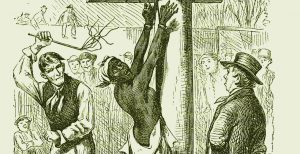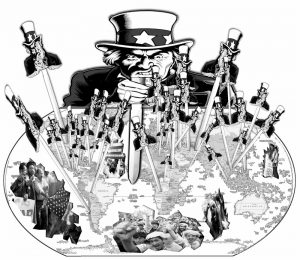Murder, Incorporated: Empire, Genocide and Manifest Destiny.
Book One: Dreaming of Empire.
Mumia Abu-Jamal and Stephen Vittoria. Foreword by Chris Hedges.
Prison Radio, 345 pp., $20.
Reviewed by Todd Steven Burroughs
LERONE BENNETT JR. IS the star of this writer’s favorite televised history discussion. In September of 2000, Bennett joined a panel of historians at the Schomburg Research Center for Black Culture to discuss his latest work, “Forced Into Glory: Abraham Lincoln’s White Dream.” In the book, Bennett portrays Lincoln as an unapologetic white supremacist who did not believe in racial equality. At one key point in the discussion, Eric Foner respectfully suggested that Bennett was still stuck in his original 1968 Ebony article about the topic. In the 32 years since then, Foner suggested, Lincoln critics like Bennett were successful in incorporating the Civil War president’s negatives into the current, ongoing (white) historical discussion. That accomplishment, if it happened, was clearly not enough for Bennett: he said he wrote his harsh book to counter the Lincoln-as-saint industry, one that has made life very comfortable for white history scholars, particularly those in prestigious academia—comfort gained at the expense of the Black and white abolitionist radicals who are not the topics of books that get large grants, yearlong fellowships and cushy professor posts.
In essence, Bennett’s book was an attack on white liberal history written by white liberal democrat-ists. Mumia Abu-Jamal knows this territory well, because he has spent his life on the literary attack. In his tenth book—this time with co-writer Stephen Vittoria, the director of the former’s 2013 documentary bio-pic, “Long Distance Revolutionary: A Journey with Mumia Abu-Jamal”—the prison writer (and former Black Panther Party member) may too be stuck—literally, since Abu-Jamal has been in jail since the early days of the Reagan era—but that doesn’t necessarily make him wrong. Using Vittoria’s unused documentary footage and a pile of books, the authors slice through American history myths faster than a spear of a Wakandan Dora Milaje. “Murder, Incorporated” is a history book for those who thought Howard Zinn, mentioned by the authors as a guiding light, was too objective, too detached; this is history text-as-underground newspaper, or –mixtape.

PROUDLY, ABU-JAMAL and Vittoria—unafraid to balance profanity (as seen soon, they literally call America’s bullshit historical analysis bullshit), American mass-media popular culture, and historic racial irony—give the middle finger to America’s view of itself. Published for the first time by Prison Radio, Abu-Jamal’s longtime commentary syndication arm and prison writing/broadcasting advocate, this book is the first fully original work from Abu-Jamal since 2009’s “Jailhouse Lawyers,” and the (gonzo and scholarly) sweat put in is seen in the final product. They successfully prove Frederick Douglass right: that America is guilty of crimes that would make a savage nation cower in shame.
The authors build on Zinn, and use his history-from-the-bottom approach to put on Black Panther Party/Students for a Democratic Society hip, late ’60s shades in order to burn an upside-down American flag on their pages. Their goal: to have the reader bend the book back in anger while reading how American imperialism, the bastard child of Western imperialism, attempted to jail and enslave the world five centuries ago. They praise the “outlaw historians,” not the “guild”-ed ones, and write about the enslavement of Africans and the pillaging of South America in ways the hero outlaws would recognize.
America’s right to exist, Abu-Jamal and Vittoria correctly argue, was not given by divine right or won through humanitarian acts. Instead, the United States is a land of criminals—founded by criminals, who committed violent criminal acts to keep and expand it, and now do malicious actions to maintain it. These facts are stated in the strongest way possible. From Christopher Columbus, the “kidnapper and slave trader,” to Thomas Jefferson, a rapist and white supremacist, to even the over-emphasis (lie?) of the Revolutionary War being about a three-cent tax on tea at the expense of the poor whites radicalized by their masters, representatives of the British Empire, into violent action. Native Americans are massacred by “a ravenous beast” they fatally befriended, South America is invaded by human “parasites” looking for gold, and America is founded by slave-trade finances: “Supporters of [Thomas] Jefferson, probably better described as apologists for Jefferson, usually defend and re-write his dark side with the idea that he was simply a product of his times and/or that he was wedged between a political rock and a hard place trying valiantly to hold together his new and precious republic. Bullshit. It was about money. Jefferson was enamored with the money he was making on his slave holdings. All these bastards were.”
After listing and detailing centuries of America’s human rights violations to both Africans and to indigenous peoples in the Americas, actions that this nation portrays as its historically controversial founding conflicts, the reader emerges bloody and depressed. Especially when absorbed is the numerous times the authors, along the way, compare U.S. past foreign policy with its present. So “Murder, Incorporated” ends with profiles of resistance in the form of abolitionist Harriet Tubman and activist the Rev. Malcolm Boyd, two religious heroes from different races and centuries who refused America’s socio-political hegemony, who showed it was possible to stand tall and strong in the eye of the red, white and blue hurricane.

ABU-JAMAL’S WRITING style—his dramatic narrative openings, followed by intellectual/historical content, lyricism (“sometimes the world dwells in a proverb,” or describing Douglass as “hurling his own omen to history”), before closing with a naked, concluding contempt for the status quo—shine through. His library of compiled Op-Ed columns/broadcast commentaries and original history books has continued to grow, despite his fighting to maintain his health while battling in 2018 for a new trial. This work, the first of a trilogy about America’s evil history, seems to be a magnum opus for both authors—a declarative statement, if not a final thought. At 64, Abu-Jamal is a burgeoning elder statesman of Black American radical letters.
But the core Foner-versus-Bennett question remains: is this very decolonizing but ultimately regurgitating Left history book necessary? Needed?
The question can be answered depending on the point of the view of the questioner. If she, for example, believes that facts are important in an age in which facts are under open attack, then the answer is yes. But if she decides American history just needs a white-liberal correction, if Zinn doesn’t need an update to get the gist, then the answer is no. But if the Koches and people like them [link to Abu-Jamal audio excerpt] continue their fight to control American history, and their regressive versions becomes the accepted ones in sections of America, destroying decades of intellectual and physical activism from various groups, will the liberal consensus matter then? Conversely, to give another example: what if, say, Pacifica Radio doesn’t survive, and one day, YouTube takes down all the radical historical material that Leftists, Black nationalists and others have placed there? Then what? History-from-below must be found in places and containers permanently controlled by those below, in places that white liberals—fair-weather friends at best, and even then, only when Republicans scare them—are too scared to go, in places that don’t help their careers.
The writers, both of whom can celebrate decades of producing nonfiction-as-resistance, think this book is necessary because imperialism—and the racism accompanying it—is portrayed as normative instead of a series of evil, greedy choices by evil, greedy white men, and that might be enough to justify it. Approved or not (and it hopes not), “Murder, Incorporated” is proud to be from the margins of American history and polite company. The sledgehammer provided here may not be of use to many right now. But, like Abu-Jamal’s nine other books, it should stay in a hidden, safe place, next to other less abstract just-in-case weapons.
-30-
Todd Steven Burroughs, Ph.D., is an independent researcher and writer based in Newark, N.J. He is the author of Warrior Princess: A People’s Biography of Ida B. Wells, and Marvel’s Black Panther: A Comic Book Biography, From Stan Lee to Ta-Nehisi Coates, both published by Diasporic Africa Press. His 2014 audiobook, Son-Shine On Cracked Sidewalks, deals with the first mayoral election of Ras Baraka, the son of the late activist and writer Amiri Baraka, in Newark. He is working on a journalistic, and, perhaps now, literary biography of Abu-Jamal.
Excellent review by Mr. Burroughs… but respectfully, I’d like to offer an alternative to one specific line that I believe is seriously off the mark regarding the development and research of the 3-book series, Murder Incorporated.
The line in question: “Using Vittoria’s unused documentary footage and a pile of books…” significantly minimizes the Herculean effort that was involved in researching and writing this 1,200+ page tome. The foundational basis for the book is my unfinished feature documentary film of the same name, which was then transitioned and transformed into the current 3-book series. More than two years of exhaustive research went into the development of the film, followed by numerous filmed interviews across the country—in-depth dialogues that averaged 1.5 hours per person and totaled nearly 30 hours. The declaration “unused documentary footage” greatly minimizes the weight and wherewithal of the film’s academic research (research bolstered by original interviews with historians, intellectuals, and folks who actually lived the history). This offhanded aside is then followed by a further slight on our research, trivializing it as “a pile of books.” This flippant characterization also greatly minimizes the prodigious task of two writers building a 1,200+ page narrative covering a 500 year story (and remember, one of those writers was on Death Row in a maximum security lockdown, no computer-internet-access to zilch). The exploration and digging was mammoth on both of our parts and the endnote citations are vast.
I say all of that to say this: don’t dis da research.
Murder Incorporated, this is a must read for me!